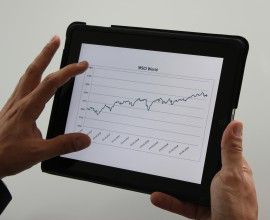
Out of energy? – an interview with Erwin Lasshofer
Q: Virtually everyone has recognized the tumbling oil price, Erwin Lasshofer, do you think that there is a bottom in sight?
Erwin Lasshofer: Well, that is hard to answer. Contrarians are standing at the front door to step in, but nobody seriously can tell, when the bottom is reached. Oil is a very complicated topic nowadays and nobody without a crystal ball is able to seriously tell when this downward trend ends. And by the way, if someone uses a crystal ball…don’t trust him, you can not take him for real anyway.
Q: Do you think, that oil will stay at this low level for longer?
Erwin Lasshofer: Currently everyone expects lower oil prices even if the argumentation could differ clearly. And as mentioned, it is not clear how low oil prices will fall. Nevertheless, it is not the first time ever that oil prices are seeing such enormous downward movement.
In the past it always ended with a sharp rebound in oil prices. Currently there are a lot of forces lowering the price of oil. But oil is the engine of the world’s economy. And I am pretty sure, that we will see higher prices not too far in the future.
Q: If the rebound will be as strong as in 2009?
Erwin Lasshofer: Hard to say, but a rebound is a scenario with high probability in my view.
Q: What are the current implications regarding the oil price?
Erwin Lasshofer: Well, they are quite diverse. A lot of people are only seeing the positive implications. The gas bill at the petrol station is far lower, leaving more money in their pockets. But this is by far not sufficient to be a positive factor in regard of the economy. Lower energy prices are also good for the industry, lowering their costs and raising the profitability. But in a lot of cases those energy reliant industries are working with long term contracts and hedged energy prices, so that there is no 1:1 effect from the current low oil prices.
On the other side we have negative implications as well, which are much more severe in my eyes. One especially important point is the debt load, that weights on the energy sector, especially in the US. The energy sector accounts for 17% – 18% percent of the high yield bond market in the US, being the biggest sector of all. And it is an open secret that investors pumped a lot of money for extremely low pickups in non-investment grade energy bonds, financing for a large part the North American oil & gas boom we saw in the last few years. It is not difficult to see, that the falling oil price makes a lot of the newly established projects out there unprofitable, making it hard for most of the companies not only to repay their debt, but even to pay the interest on their debt. Estimations show, that the default rate within the HY market will rise noticeably in the next few months. This could cause a chain reaction, as spreads will rise – actually they already started to rise, especially in the energy sector – and refinancing for companies – not only from the energy sector – will be much more difficult. Of course the banking sector would be involved as well, as a lot of banks are engaged in project financing and helped financing a lot of those energy projects in the recent years.
Furthermore the economic growth in the US became extremely dependent on the Oil & Gas Industry. You only have to look at job creation in this sector within the last few years. But of course the capex fueled the growth as well. The lower oil prices already lead to a lot of smaller producers are working below breakeven and especially bigger companies slashed the capex massively. So there definitely will be an economic impact from this side, especially in the US.
Q: Do you think that oil is an interesting commodity to invest in?
Erwin Lasshofer: I think that oil is an interesting topic to invest, but this does not mean, that I recommend investing directly into oil. Direct investments are a bit complicated because of the structure of future contracts. In oil we traditionally have a contango situation, meaning that the longer futures have a higher price than the ones expiring earlier. A direct oil investment has to roll the futures when they expire, therefore paying a higher price for the next future you invest in, leading to costs and creating a negative return. This negative roll return lowers the performance of the overall investments. Currently the January 2017 Future quotes approximately 30% higher than the current WTI Spot. So based on today’s future structure WTI needs to rise for nearly a third in two years, that you even earn the roll costs.
Q: But if oil is an interesting topic to invest in, what are the alternatives?
Erwin Lasshofer: The development of the oil prices lead to a lot of interesting opportunities in other areas. Oil stocks for example are often at interesting levels. A lot of oil names out there are fundamentally sound and can be used for products, with an interesting payout profile. It is not about investing on a direct basis on those stocks, but investing with generating a kind of a security buffer. We are also thinking about other ways to invest into oil. Currencies are an interesting way for example.
Q: And what is your current impression of the overall market?
Erwin Lasshofer: It is a difficult situation for investors currently, as in a lot of asset classes the levels are quite high and in regard of volatility the levels are extremely low, so that the environment for structured products is also not an easy one. Nevertheless we have solutions, which also work in the current environment.
Q: Anything special that you would recommend?
Erwin Lasshofer: Well, INNOVATIS would recommend investing in some core products we developed. They are independent from the market, don’t need any market timing and offer a very decent and secure yield. These core products should work as the basis in a portfolio. Beyond this the investor should look for special situations like we have it in oil currently. There he can place something like satellites, which are more a timing case using special situations on the markets allowing to structure good products.
Q: Thank you for the interview Mr. Lasshofer.
Archives
- June 2019 (1)
- March 2019 (1)
- February 2019 (1)
- December 2018 (1)
- May 2018 (1)
- January 2018 (1)
- December 2017 (2)
- October 2017 (1)
- September 2017 (1)
- August 2017 (1)
- July 2017 (1)
- June 2017 (2)
- May 2017 (2)
- April 2017 (2)
- March 2017 (3)
- February 2017 (2)
- January 2017 (2)
- December 2016 (4)
- November 2016 (3)
- October 2016 (3)
- September 2016 (2)
- August 2016 (5)
- July 2016 (2)
- June 2016 (4)
- May 2016 (1)
- April 2016 (4)
- March 2016 (5)
- February 2016 (3)
- January 2016 (3)
- December 2015 (5)
- November 2015 (5)
- October 2015 (4)
- September 2015 (3)
- August 2015 (7)
- July 2015 (7)
- June 2015 (5)
- May 2015 (6)
- April 2015 (9)
- March 2015 (9)
- February 2015 (9)
- January 2015 (9)
- December 2014 (11)
- November 2014 (10)
- October 2014 (3)
- September 2014 (1)
- August 2014 (2)
- July 2014 (2)
 Investor Login
Investor Login

